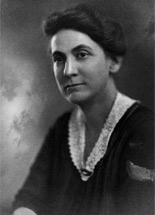SSA Centennial Celebration
Profiles of Distinction Series
Grace Abbott, Ph.M. (Political Science) 1909
Younger sister to Edith Abbott, Professor Grace Abbott was born in 1878. Her lifelong commitment to social reform began in Grand Island, Nebraska in a family that prized education and political involvement.
After attending the Grand Island Baptist College, Miss Abbott briefly taught high school in Grand Island and Broken Bow. She left Nebraska in 1907 to pursue graduate study in law at the University of Chicago, but her developing interest in social work led her to stop with a Ph.M. in 1909. She took up residency at Jane Addams' Hull House in 1908, and that same year, she became director of the Immigrants' Protective League, organized to protect immigrants from exploitation and to help them adjust to American life. She continued as director until 1917. For several years, she also taught at the University of Chicago and the Chicago School of Civics and Philanthropy.
In her time at the IPL, Miss Abbott worked tirelessly to improve the quality of life for immigrants. Her achievements included securing new state legislation protecting immigrants from exploitation by private employment agencies and private immigrant “banks” and devising a state plan to enforce compulsory school attendance for immigrant children. In 1912, she successfully persuaded President William Howard Taft to veto an act of Congress requiring literacy tests for entry into the country.
In tandem with her advocacy on behalf of immigrants, Miss Abbott also became active in the labor movements of her time. As a member of the Women’s Trade Union League, she championed garment workers in their battle for better working conditions.
In 1917, Miss Abbott joined her former Chicago colleague, Julia Lathrop, in Washington at the Children’s Bureau of the U.S. Department of Labor as director of the Industrial Division. There she developed enforcement plans for the first federal child labor laws enacted by Congress in 1916. Under her leadership, all of the major shipbuilding plants on the Atlantic Coast, the Gulf of Mexico, and the Great Lakes were inspected for compliance in 1919.
Miss Abbott briefly returned to Chicago to serve as executive secretary of the Illinois State Immigrants Commission and then as chair of the child labor section, Illinois State Children's Commission. Then in 1921, President Warren G. Harding appointed her as chief of the Children's Bureau. Her many accomplishments included the passage of the Sheppard-Towner Act. This law provided the first federal grants to aid the social welfare of children. It also authorized government cooperation with the states in promoting maternal and child health.
Miss Abbott pioneered the process of collecting and incorporating sociological data relating to child labor, juvenile delinquency, and dependancy and on the work of local and private agencies into the lawmaking process. Her leadership helped fund over 100 social research investigations, many of which were conducted by the School of Social Service Administration. Among the most important of these studies were: "Maternal Mortality in 15 States," "Children in Agriculture," Children in Street Work," Illegally Employed Minors and Workmen's Compensation," and "Youth and Crime." In 1929, she responded to the Depression by advocating for federal aid for relief and collected and distributed to national agencies relief reports from 203 cities.
In addition to her responsibilities at the Children’s Bureau, from 1922 to 1934 Miss Abbott was the official representative of the U.S. on the League of Nations' advisory committees on trafficking of women and on child welfare. She also served as President of the National Conference of Social Work and on the committee organizing the first Conference on Social Work, held in Paris in 1928.
By 1934, Miss Abbott was ready to exchange the frustrations of government work for the freedom of expression afforded by academia. Upon her resignation as chief of the Children’s Bureau, President Franklin Delano Roosevelt described her career as one of "inestimable value to the children, the mothers, and fathers of the country, as well as to the Federal and state governments."
Until her death in 1939, Miss Abbott held a professorship at SSA and was editor of the Social Service Review. She remained politically involved in her final years, serving on President Roosevelt's council on economic security and helping to draft the Social Security Act. She continued to chair international labor conferences and state committees dealing with child labor, and to support many causes, including the peace movement and women's rights.
